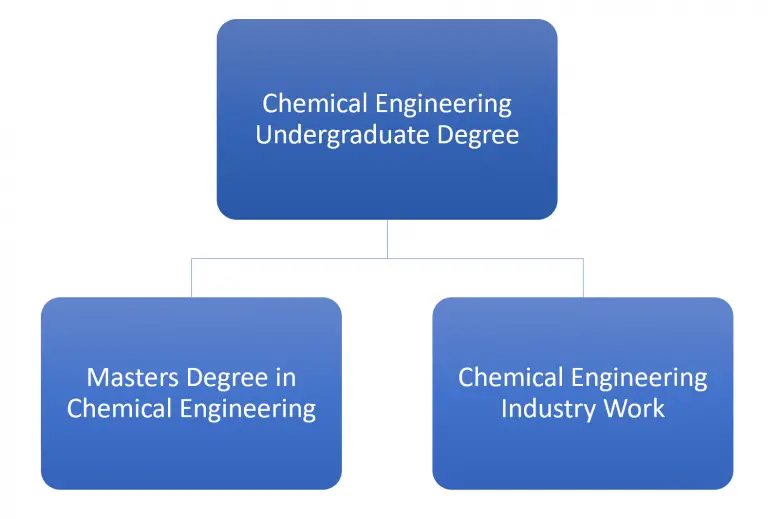
In a majority of countries, a bachelors in chemical engineering is a working degree, meaning that you can go straight into to the workforce after graduating, and you do not necessarily need to pursue higher studies to get a job.
As a result, chemical engineers have the option to either pursue higher studies, or enter the workforce after completing their 4 year bachelors program at the undergraduate level.

But which one is the better choice?
If you are in the chemical engineering undergraduate program or recently graduated, you may be wondering if getting a masters in chemical engineering is right for you, and worth the significant time and financial investment.
The goal of this article is to answer these questions and more with perspectives from real engineers in the chemical engineering masters program.
A masters in chemical engineering is typically a 1-2 year program that focuses on refining the existing skills and research experience that students have. This is done through technical training, research seminars and course work which focus on a specialized area of knowledge within the chemical engineering didispline.
Some examples are separation processes, nanotechnology, reaction engineering, polymer science or interfacial phenomenon.
A masters in chemical engineering is generally broken into a thesis vs non thesis opinion. The thesis option is much more research heavy, while the non-thesis option focuses on more course work.
Every university will have different requirements, but most will have a minimum percentage or GPA for the last 2 years in your undergraduate bachelor’s degree. Additionally, resumes and references will most likely need to be provided.
Most graduate chemical engineering programs have a few core courses that every student has to take, and the rest are chosen based on specific interests.
Some examples of these courses could be advanced reactor design, advanced process control, advanced fluid mechanics, mathematical operations in chemical engineering, statistical mechanics, biological engineering etc.
Getting a masters of chemical engineering is expensive.
However, with many scholarship opportunities available to students, the financial burden can become a lot more bearable. Make sure you familiarize yourself with all of the scholarship opportunities available to you and apply to as many as you can.
Here is a short list of some of the chemical engineering specific scholarships for masters programs
With a masters degree in chemical engineering, you can apply to all of the typical chemical engineering job titles that are listed for new graduate chemical engineers with an undergraduate degree, but also some titles that are specifically looking for graduate students. Oftentimes if a graduate role is encouraged or required, the term graduate will be used in front of the title.
These titles could include
If you decide to go down the academia route, you can also find a teaching position or a research position at a university that usually requires you to have a minimum of a masters degree in engineering.
Looking at average salary increases with an undergraduate degree vs master degree in such a vast field such as chemical engineering is not particularly useful.
What is useful is understanding that having a masters degree opens up a range of jobs that do pay higher on average than jobs that require just an undergraduate degree.
Furthermore, remember that with a chemical engineering masters, it is important to leverage your skills and experience to negotiate for a higher wage.
The job market is very competitive so it helps to stand out as much as possible.
As a masters of chemical engineering, you develop a deeper and more well rounded understanding of your specialization within chemical engineering. Many job applications we have seen state that “a graduate degree is an asset” which gives you an opportunity to instantly become more competitive within the job pool.

PhD Student in Chemical Engineering
If you don't want to stay in the academic or research field, you can always do a masters of engineering which would give you a better technical knowledge of the field, things you could apply directly in a job.
Either way, it helps you move forward in your career. Better chances with jobs, be it academia, research, or more traditional industry positions. Whether its an MSc or MEng, I'd recommend it.
As a masters chemical engineering graduate, you will be applicable for a wider range of jobs that require you to have a specialized skill set that you can learn in your stream of the graduate program.
For example, you may be able to get a job as a project engineer in the polymers group which is a role that typically requires a masters or PhD qualification. However, keep in mind that you need to have some applicable work experience coupled with your education to make you unstoppable.
If you decide to apply to a job that does not require you to have a masters degree, there is often a premium increase in your salary because of your masters degree. If not, you have more leverage than candidates to negotiate a salary increase for the additional knowledge and skills that you can bring into the role.
It seems to be a consensus amongst chemical engineering masters students that graduating from the masters program is really when you are able to solidify the concepts that you learned in the undergraduate chemical engineering program.
For example, unit operations or separation processes was a field in the undergraduate program that was theoretical, calculation heavy and challenging for most students to grasp. In a masters program focused on process system engineering for example, students have made it clear that they come out fully understanding how critical separation equipment works, and have developed a deep appreciation for their purpose.
Although some countries like the US have programs that allow you to go straight into the PhD program with a bachelor’s degree, there are still many countries that follow the traditional route of requiring a masters before a PhD. Regardless, there are many advantages of having a masters degree before going into the PhD program.
For example, you get the opportunity to get rid of any doubts and test the waters into higher education without immersing yourself into a 3-7 year PhD program right away. If you do not have a clear idea of what you want to study, a masters is a great way of finding out where your research interests are. The chemical engineering masters program is also easier to get into than the PhD program, however when you graduate, you are most competitive for the PhD program. You will also get the opportunity to get experience and connections at different universities and the academic environments that they have.
When you enter into the masters program, you are investing a significant amount of capital and time into your education. Regardless of what the investment is, you need to make sure that you are getting a return on that investment.
If you decide to go into a masters of chemical engineering, you need to realize that you are losing out on 2 years of valuable industry work experience, and the financial savings from that period.
Most people do not realize how compound interest works in the investment world, but the rule is simple. Compound interest on your investments follow an exponential curve, rather than a linear one. This means that investing earnings of even 1000/month from your work experience 2 years earlier over a 40 year period could be an additional $300,000 at a modest average yearly market return of 7%.
It is possible for companies to see you as “overqualified” with a masters in chemical engineering and go with new graduate bachelors in chemical engineering instead. This way, they may avoid dealing with paying a higher wage for your higher education.
Since you have not had any real world post graduate work experience, it may be difficult to gauge what you really want to specialize in after your bachelors program. The masters program requires you to niche down quickly, and if you make a decision, it may end up being a rough time for you through the program.
You should strongly consider applying for a masters in chemical engineering if
Here at The Engineers Perspective, we recommend that if you do not resonate with any of the considerations listed above, you consider jumping into the job market and gaining some real world work experience first.
The great thing about this choice is that you have the time and opportunity to really think about what you enjoy, making some money, and still have the option of going back to do your masters degree in chemical engineering.
Ask yourself the following questions
If you are passionate about the masters program you have chosen, understand the critical role it will play in your long term game plan, and can justify the financial investment to yourself, then congratulations!
A masters degree in chemical engineering is an incredible journey, and I hope this article will give you a clear picture of the entire progress from start to finish.
One Response
Found this article very useful. Each and every point is specific.